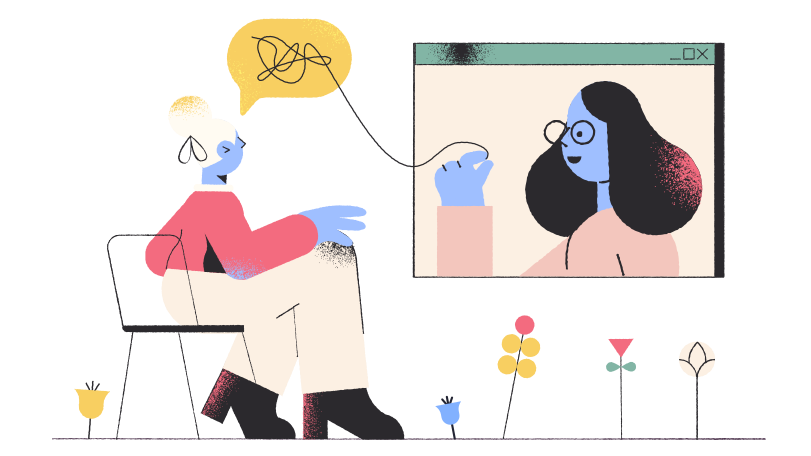Four Strategies For Anxiety and Depression When Facing Chronic Pain
Mar 05, 2023
Chronic pain can lead to mental health challenges and these 4 strategies can help.
Chronic pain is a persistent and ongoing pain that lasts for months or even years. It can have a significant impact on a person's mental health, and can lead to anxiety and depression due to several factors:
Changes in Brain Chemistry
Chronic pain can alter the levels of neurotransmitters in the brain that regulate mood, such as serotonin and dopamine. This disruption in the brain's chemical balance can lead to feelings of anxiety and depression.
Sleep Disturbances
Chronic pain can interfere with a person's ability to sleep, leading to sleep disturbances and insomnia. Lack of quality sleep can exacerbate anxiety and depression symptoms.
Social Isolation
Chronic pain can limit a person's ability to participate in social activities, leading to feelings of social isolation and loneliness. This isolation can contribute to the development of anxiety and depression.
Reduced Quality of Life
Chronic pain can limit a person's ability to carry out daily activities, leading to a reduced quality of life. This loss of function can lead to feelings of helplessness, hopelessness, and depression.
Negative Thinking Patterns
Chronic pain can cause negative thinking patterns, such as catastrophizing and rumination, which can contribute to the development of anxiety and depression.

Since chronic pain often has such a great impact on both physical and emotional well-being, it is important for sufferers to seek appropriate treatment for both.
Here are four ways to help manage pain-associated anxiety and depression:
1. Mindfulness
Mindfulness techniques can help individuals anchor their attention in the present moment, and can provide moments of reprieve from the mental anguish that often exacerbates chronic pain. Mindfulness also helps individuals become more aware of the mind-body connection and how emotions can impact physical sensations. By focusing on the breath or another sensation, individuals can train their minds to be more present, which can help alleviate anxiety and increase their overall well-being.
Here are two practices that can help relax the mind and body.
- Mindful Breathing: Practice breathing exercises to calm your mind and relax your body. If you notice tension or anxiety arising, try to take a kind and accepting stance to whatever is showing up. Remember that it’s not about clearing your mind or not being distracted - you can shorten your practices or let go of them completely at any time. Try this brief mindful pause (2-min) or this longer mindful breathing practice (10-min).
- Body Scan Meditation: This involves focusing your attention on different parts of your body, from your toes all the way up to the crown of your head. With each breath, bring your attention to a different area of your body, noticing any sensations, pain or discomfort. Finish off with an awareness of sensations in your entire body. Remembering that if at any time sensations become too challenging you can always release the practice. This practice can create more space around pain in your body. Try this guided body scan practice (12-min).
2. Movement
While many pain sufferers can feel limited when it comes to exercise, gentle movement such as yoga, tai chi, or qigong can help reduce tension in both the body and mind. These practices that use subtle movements to aid in energy flow can improve vitality, flexibility and mood. Mindful Movement focuses on the sensations in your body as you move, maintaining a non-judgemental and accepting stance towards whatever thoughts, emotions or sensations may arise.
3. Gratitude
Practicing gratitude can help an individual shift their focus away from pain and toward positive aspects of life. Research shows that writing down three things we are grateful for each day, or taking a moment each day to reflect on something we appreciate can have a positive impact on our connection with the world around us, and our overall well being.
Journaling about what we are grateful for before bed can help to shift our focus from pain and worry to positive experiences and emotions, leading to a more peaceful and restful sleep.
4. Seeking Emotional Support
Overcoming anxiety and depression can be difficult for any individual, but for those also suffering from chronic pain, it can be extra challenging. With the right support and resources, individuals can learn to manage mental lows more effectively. Finding a specialized counselor, group or community to share experiences of adversity and help integrate trauma can help individuals feel less isolated.
Anxiety and depression can differ greatly between each individual, and are often multi-layered, which may require several types of strategies, therapies or medication. While these above strategies do not claim to eliminate mental unease entirely, they can help in coping with it more effectively. It is important to note that these strategies should not replace medical treatment, and you should always consult with your healthcare provider about the best approach for managing chronic pain-associated anxiety and depression.

Michael Apollo MHSc RP is the founder of the Mindful Society Global Institute. Prior to founding MSGI in 2014, he was the Program Director of Mindfulness at the University of Toronto. He is an educator, licensed mental health clinician and certified facilitator in Mindfulness-Based Stress Reduction and Mindfulness-Based Cognitive Therapy.
References:
Join our weekly newsletter for insightful articles and free events
Be the first to learn about upcoming FREE events, receive early bird pricing for courses and stay in touch with weekly newsletters!


